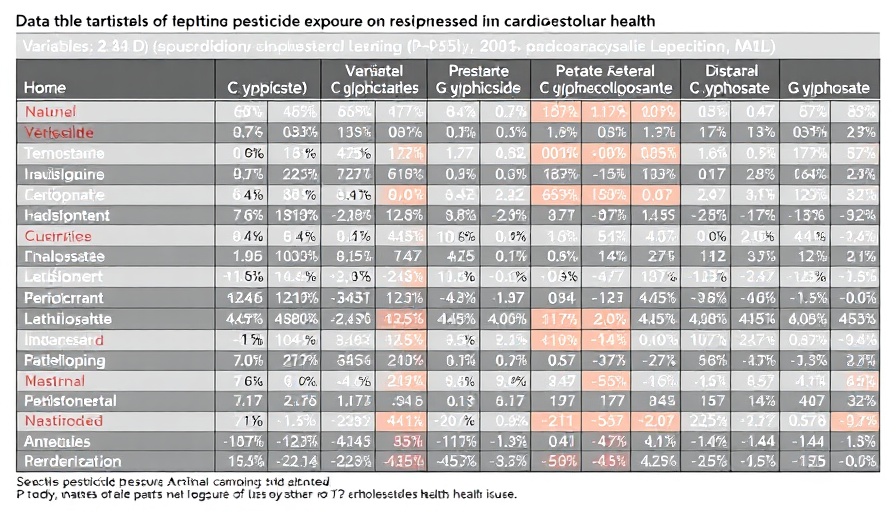
Unveiling the Dangers: How Pesticides Impact Cardiovascular Health
Pesticide exposure has increasingly become a hot topic in public health discussions, especially concerning its hidden peril to cardiovascular health among populations without pre-existing heart conditions. Recent research utilizing data from the National Health and Nutrition Examination Survey (NHANES) from 2007 to 2018 sheds light on this crucial issue. The study examined the influence of various pesticide biomarkers on cardiovascular health, measured using Life's Essential 8 (LE8) scores and the Cardiometabolic Index (CMI).
The Study at a Glance: Key Findings
Analyzing data from 12,432 individuals, researchers focused on the biomarkers associated with five types of pesticides: 2,4-D herbicides, atrazine metabolites, organophosphate dimethyl and diethyl metabolites, and glyphosate. The results revealed alarming correlations, particularly highlighting how 2,4-D herbicides led to significant declines in various LE8 components, including body mass index (BMI) and dietary scores. These findings underscore the urgent need to address pesticide exposure in the context of public health, as they pose significant threats to cardiovascular wellness.
Understanding Pesticides: Types and Their Effects
Research findings indicated that the effects of pesticides aren't uniform. The study notably spotlighted glyphosate, which was shown to significantly contribute to LE8 scores (58%). Meanwhile, organophosphate diethyl metabolites played a major role in influencing CMI (62%). This differential impact implies that not all pesticides carry the same risks, and understanding these differences could be pivotal in developing targeted health interventions.
Environmental and Health Cost of Pesticide Use
Globally, over 160,000 deaths annually are attributed to pesticide exposure, particularly in developing countries where safety measures are lacking. Previous epidemiological analyses link pesticide exposure not only to cardiovascular issues but also to myriad chronic conditions such as neurological disorders and endocrine dysfunction. As such, the need for regulatory frameworks and proactive measures to mitigate exposure is paramount.
Why This Matters to You: Making Connections Between Nutrition and Health
If you're a health-conscious individual aged 30 to 55, understanding the role of dietary choices and environmental factors like pesticide exposure is essential for longevity and wellness. Incorporating nutrients known for their anti-aging benefits, such as Omega-3 fatty acids, NAD+ supplements, and Resveratrol, can help counteract potential health risks. These supplements not only promote cellular health but can also improve cardiovascular wellbeing, bridging the gap between nutrition and preventive health.
Action Steps for Longevity: Nourishing Your Body
Enhancing your vitality doesn't have to be complicated. Consider integrating longevity nutraceuticals into your daily routine. For instance, CoQ10 is renowned for its cardiovascular benefits, while collagen can support overall cellular health. Furthermore, incorporating adaptogens can enhance your body’s ability to manage stress, championing not only physical but also mental wellness.
Take Charge of Your Health: What's Next?
The insights gleaned from the study on pesticide exposure serve as a wake-up call for those striving for holistic wellness. By understanding the implications of what we consume and the environment we inhabit, individuals can make informed choices that promote longevity and vitality. Explore anti-aging supplements today and invest in your health for a better tomorrow.
Together, we can cultivate a community of wellness enthusiasts empowered to navigate dietary choices with awareness of their health ramifications. Stay informed, take actionable steps, and prioritize your cardiovascular health!
 Add Row
Add Row  Add
Add 




Write A Comment